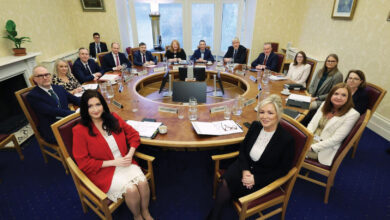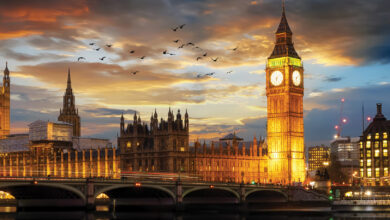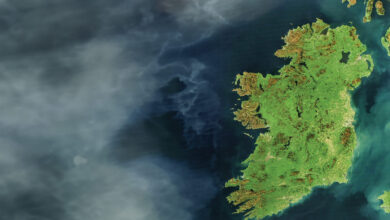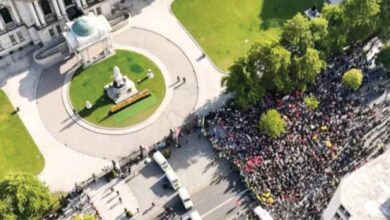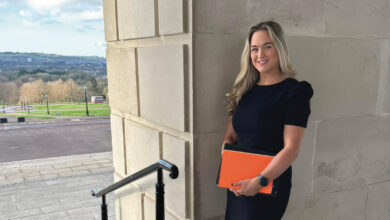America’s decision
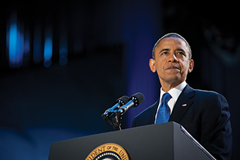 Local reflections on Barack Obama’s re-election as US President.
Local reflections on Barack Obama’s re-election as US President.
“Tonight, more than 200 years after a former colony won the right to determine its own destiny, the task of perfecting our union moves forward.” Amid the massive challenges facing Barack Obama, the President returned to soaring rhetoric as he addressed supporters in Chicago.
Over in Boston, Mitt Romney conceded defeat graciously and called on Democrat and Republican leaders “to reach across the aisle to do the people’s work” and on citizens to “rise to the occasion” as well. Winning 206 electoral votes was an improvement for the Republicans on John McCain’s 173 in 2008, with gains in North Carolina and Indiana. Obama, though, secured victory by holding all the swing states and appealing to a wider coalition of support.
agendaNi talked to US Consul-General Greg Burton about his impressions of the campaign.
“My sense was that people were following it very closely,” he said of the local interest in the election. “I cannot think of a conversation that I had in the two months leading up to the election that didn’t touch on the election. In a very anecdotal and personal way, I felt that people were very focused on it.”
Every four years, the consulate-general traditionally organises its own presidential debate, involving teams of students from Queen’s University and the University of Ulster. The 2012 debate was won by Queen’s (for Obama), although University of Ulster’s Garreth Quigley put in the best individual performance.
The narrow margin between presidential candidates, in Burton’s view, is explained by the two main parties both having strong bases. “At the end of the day,” he added, “in an election campaign, the trick is to pull the middle into your camp so that you gain the votes.”
Growing up in Pennsylvania in the 1970s, he remembered people being excited by the campaigns and “kids walking around the polling stations to see what was happening” on election day. “There was always a little bit of mystery about the process” with everybody waiting for the final result. Voting, he concluded, is “part of our civic responsibility in America.”
Peter Robinson and Martin McGuinness jointly welcomed the President’s re-election. “The American administration has always been a strong supporter of the peace and political process and we do not underestimate the positive role it has played over recent years,” they stated.
A forthright Mark Durkan has called on Obama to be “more active and ethical in using his stature in pursuit of peace, international justice and human rights in the Middle East.” David Ford hoped that he would continue to deliver on his liberal policies on foreign affairs, environmental protection, energy and equality.
For his part, Green MLA Steven Agnew had backed the “excellent and strongly-principled” US Green Party candidate Jill Stein, who had polled 414,545 votes.
Jim Nicholson’s European Conservatives and Reformists group is allied to the Republican Party. Its leader, Martin Callanan, had supported Mitt Romney but Nicholson felt that, on balance, Obama was the better candidate.
“We may have battled fiercely,” Obama reflected in Chicago, “but it’s only because we love this country deeply and we care so strongly about its future.”
Politics pupils give their views
Pupils and teachers from Lurgan College and St Michael’s Grammar School attended the US Consulate-General’s post-election breakfast, at Belfast Metropolitan College’s Springvale campus.
“From day to day, it changed so you didn’t know who was going to actually win,” Dylan Murphy remarked. Rebecca Taylor was surprised that Mitt did as well as he did and thought that he would win more states. “It wasn’t as close as I thought it would be,” Adam Casey said, while Dylan McAtamney “didn’t really expect Obama to win as many swing states as he did”.
“I didn’t think it would be as exciting as it was,” Shannon Dowds said, but she thought that the result would have been “closer than it ended up.” Renwick Sharp, commented that the campaign was “very expensive.”
Rebecca McLoughlin felt that Romney was “open misogynistic” whereas Obama was “more trustworthy on women” e.g. by advocating equal pay. Ciara Mackle, though, found the Republican candidate “very, very graceful in his defeat.”

